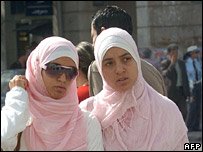Secularism Islamic-style
 Islamic headscarves are banned in schools and government offices (Photo-AFP)
Islamic headscarves are banned in schools and government offices (Photo-AFP)The Tunisian authorities have launched a campaign against the Islamic veil worn by some women to cover their hair. Police are applying with renewed vigour a decree dating back to 1981 which prohibits women from wearing Islamic headscarves in public places.
In recent days, senior officials have hit out at what they describe as sectarian dress worn by people who use religion to hide political aims. Under a ban introduced in 1981, women in Tunisia are not allowed to wear Islamic dress in schools or government offices. Those who insist on it face losing their jobs.
The President, Zine El Abidine Ali, described the headscarf as a sectarian form of dress which had come into Tunisia uninvited. Other officials said Islamic dress was being promoted by extremists who exploited religion for their political ambitions.
They say many people are upset by the ban, but that in a country where dissent is not tolerated they dare not show their anger. Mr Ben Ali has been keen to restrict the spread of ideas or signs and religious symbols which could strengthen the country's outlawed Islamic opposition.
BBC

0 Comments:
Post a Comment
<< Home